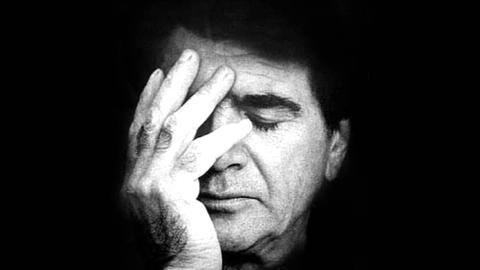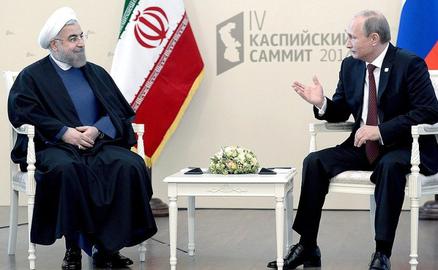Last week, Hojatoleslam Ahmad Mazani, the reformist member of parliament’s Committee on Culture, suggested that Fajr Music Festival should hold a ceremony to honor the achievements of Mohammad Reza Shajarian, one of Iran’s most famous and celebrated singers. The festival’s secretary, Hamid Reza Nourbakhsh, agreed, and told Iranian Labour News Agency that all that remained for the event to go ahead was for “Master Shajarian” to say yes.
It’s not the first time that Iranian politicians have publicly praised the master of Iranian traditional music. Exactly one month before he died, Akbar Hashemi Rafsanjani sent Shajarian two rings said to have been made from the stone of the Shia saint Imam Hossein as a gift. In September 2016, newspapers marked the singer’s 76th birthday, and the official state newspaper Iran featured a photograph of him on its front page. Back in 2013, Hassan Rouhani cited him as his favorite singer, and even used one of his songs in his campaign video.
It’s not out of the ordinary for a country to celebrate a world-renowned performer and recipient of many international awards. But what sets him apart from other celebrated artists across the world is that he faces a ban in his own country. And despite public demonstrations of support and admiration from key officials, the ban on Shajarian continues.
It has now been seven years since the Islamic Republic of Iran Broadcasting (IRIB) first banned Shajarian’s voice, photograph and even his name from being broadcast on state-run radio and television. The ban was a punishment for his support for the “wrong” side in 2009’s disputed presidential election. When millions of Iranian people went out on the streets to protest against the official results of the election — which gave Mahmoud Ahmadinejad a second term in office — Shajarian joined them. He released a song entitled Language of Fire to support protesters, posting it online. “Lay down your gun,” the song begins. “I hate this weird shedding of blood. The gun in your hand speaks the language of fire and iron.”
After IRIB made extensive use of several of Shajarian’s songs that featured patriotic themes, the singer wrote to Ezzatolah Zarghami, head of IRIB at the time, and asked him to stop broadcasting his music. In the letter, he said his patriotic songs — especially O Iran, The Home of Hope — belonged to the years leading up to the Islamic Revolution of 1979 and had nothing to do whatsoever with was going on at the time, he said.
“The Voice of Dirt and Dust”
“My voice has no place at IRIB when people are stunned and, according to Mr. Ahmadinejad, ‘the dirt and dust are on the move,’” he told BBC Persian when asked about the letter. “My voice is the voice of dirt and dust and will always remain so.” He told the BBC that whenever he heard his own voice on Iranian radio and TV he felt ashamed and his whole body started shaking.
At this point, IRIB executives decided to make their own move and write off Shajarian in a more permanent manner. The network usually broadcasted the singer’s Ramadan song each year, playing it throughout the holy month of fasting. But in 2009, IRIB refused to play the song. The public complained, but it made no difference: Shajarian completely disappeared from state TV and radio.
In addition to the IRIB ban, Shajarian was prohibited from officially releasing his albums until September 2016, when he returned to Iran after a trip abroad for medical treatment and was allowed to release his album The Way of Love, a collection of songs from a 1989 concert tour in Europe.
But although authorities permitted the album release, Shajarian was banned from attending the album’s launch event. In the end, his son Homayoon performed at the ceremony on his behalf, telling the audience that his father was not feeling well and was unable to leave home.
Since Shajarian could not obtain permits to perform live in Iran, he decided to schedule concerts in neighboring countries. When he canceled booked performances in Turkey and Armenia, rumors emerged both about his ill health and that not enough tickets had been sold. He then issued a statement to his fans saying that his doctor had advised him to forgo the trip. “My doctor found things in my MRI and asked me categorically to cancel my trip and spend six to eight weeks in treatment under his supervision,” he wrote. “I reluctantly had to agree.”
Uninvited Guest
Then, in a video posted on March 20, 2016 to mark the Iranian new year, he revealed that for the last 15 years he had been suffering from cancer — or, as he called it, the “uninvited guest.”
After the video was published, Iranian Health Minister Hassan Ghazizadeh Hashemi personally phoned Shajarian. “It is my duty because of the position I have in the government to do everything I can to accelerate his recovery,” Ghazizadeh Hashemi wrote on his Instagram page. But IRIB kept Shajarian’s voice off air. And it went further: When traditional Persian singer Vahid Taj wished him a full recovery on a TV program, his statements were censored.
The ban on Shajarian performing live in Iran remains in place. For this reason, he might refuse Fajr Music Festival’s offer to organize a ceremony in his honor. But the Iranian people have never stopped celebrating him. In addition to the newspaper reports, fans posted happy birthday wishes and videos featuring his music on social network sites, including on Shajarian’s Instagram page. Well-known Iranian artists and politicians were among the well-wishers. One confectioner made pastries featuring Shajarian’s face on them to celebrate.
And just a few days after the news that Shajarian’s cancer had spread, Farzad Talebi, the new director general of the Music Department at the Ministry of Culture and Islamic Guidance, announced: “We will do our best to remove the obstacles in the way of Shajarian’s activities so that people can have access to his works of art.” But everyone knows the obstacles remain in place.
The situation might not be entirely unique to Iran, but it is bizarre nonetheless. Despite the outpouring of love and respect for Shajarian from the public, and from politicians and government officials, and despite the desire to seem him publicly honored, Iran’s state broadcaster will not budge, and continues to blacklist him.
visit the accountability section
In this section of Iran Wire, you can contact the officials and launch your campaign for various problems

























comments